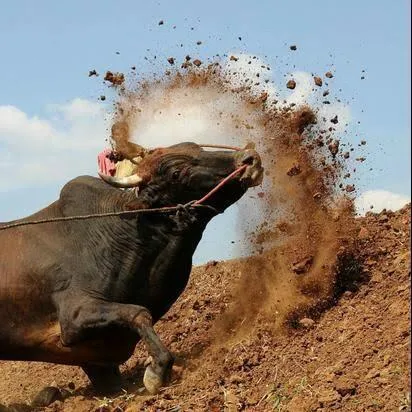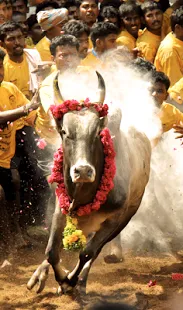
Jallikattu is a traditional event in Tamil Nadu. It is an ancient Tamil event where participants try to embrace a bull. It displays the bravery of a person who embraces the bull. The person who wins the event was awarded with money in the ancient Tamil period.
The earliest history of Jallikattu was from about 2500 years ago. It is held on the day of third day of Pongal festival and second day of Thai month of the Tamil calendar which is known as Maatu Pongal.

'''Jallikattu''' - ஜல்லிகட்டு is a cattle/ bulltaming sport played in Tamil Nadu as a part of Pongal celebration. This is one of the oldest living ancient sports seen in the modern era. It is held in the villages of Tamil Nadu as a part of the village festival. The festivals are held from January to July, every year. The one held in Alanganallur, near Madurai, is one of the more popular events. This sport is also known as "Manju Virattu", meaning "chasing the bull".
Jallikattu is based on the simple concept of "flight or fight". Cattle being herd and prey animals in general tend to run away from unwanted situations. But there are quite noteworthy exceptions. Cape buffalos are famous for standing up against lions and killing them. The Indian Gaur bull is known for standing its ground against predators and tigers think twice about attacking a full grown Gaur bull. Aurochs, the ancestor of domestic cattle was known for its pugnacious nature. Jallikattu bulls belong to a few specific breeds of cattle that descended from the kangayam breed of cattle and these cattle are very pugnacious by nature. These cattle are reared in huge herds numbering in hundreds with a few cowherds tending to them. These cattle are for all practical comparisons, wild and only the cowherds can mingle with them without any fear of being attacked. It is from these herds that calves with good characteristics and body conformation are selected and reared to become jallikattu bulls. These bulls attack not because they are irritated or agitated or frightened, but because that is their basic nature.